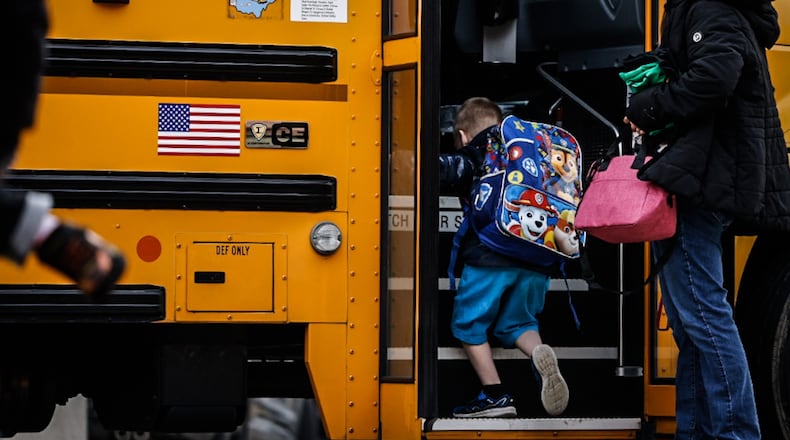The Vandalia-Butler school district’s five-year additional 1% income tax request has failed by a nearly 20-point margin, with results showing 40.7% of votes in favor and 59.3% against.
Northmont’s 7.82-mill property tax levy request failed by a slightly narrower gap, showing 42.3% of votes in favor and 57.7% against.
In Riverside, the Mad River school district’s 5.9-mill operating levy request has also failed, with results that show 44.8% of votes in favor and 55.2% against.
Huber Heights levy
Huber Heights City School District’s 8.12-mill property tax levy request is the largest new-money school property tax levy in the past decade in the four-county area — Montgomery, Miami, Greene and northern Warren — and district officials say its passage is critical in order to maintain financial security for the long term.
Superintendent Jason Enix said Tuesday evening the board will reconvene to determine next steps based on the release of the next state education budget for years 2024-2025, and how that may affect its five-year forecast.
“We will regroup and see where things go for us in the future,” Enix said. “... We know inflation and the cost of everything is going up, and that certainly puts a squeeze on family budgets, which we understand, as it’s putting the squeeze on our school district budget, too. It’s a challenging time.”
Huber Heights officials say the school district began deficit spending last year. Deficit spending is expected to continue over the next five years ($4.4 million projected this year), district officials say, making it difficult to continue services at the current level.
Earlier this year, the district approved a $1.7 million budget cut, which will go into effect during the 2023-24 school year, and will include some cuts to administration, classified personnel, and anticipated hiring, as well as the reallocation of federal grants, and reduction of funding for things like after-school tutoring and staff training.
Vandalia-Butler levy
The Vandalia-Butler school district’s request for an additional 1% income tax would have lasted five years and generated about $6.4 million per year for the schools. A 1% tax would have cost $500 per year for a person with $50,000 in qualifying income.
District spokeswoman Mary Stephens affirmed Tuesday the district will implement its previously announced plan to cut $1.8 million in costs beginning this fall.
Stephens said the district will ask voters again this fall to approve a levy, the details of which will be determined at a later date.
“While a specific tax rate has not been approved, the district will begin these discussions and explorations immediately,” she said.
If a new-money levy is not approved by November 2023, further cuts of about $2.8 million are anticipated, including more than 18 teacher positions and reductions in programs like art and physical education for elementary kids.
Vandalia-Butler schools last sought a tax increase for daily school operations in November 2013 when a 6.99-mill property tax levy narrowly passed.
Per the district’s five-year forecast, Vandalia anticipates running out of cash around January of 2025 due to deficit spending. At the end of last school year, they had about 23% of a year’s expenses in the bank, lower than the regional average of 35-40%.
Northmont levy
Northmont’s 7.82-mill property tax levy would have raised $5.8 million annually for the school district, costing homeowners about $274 per $100,000 in property value.
Northmont spokeswoman Jenny Wood said Tuesday the district will continue to offer students “as many opportunities for success as cuts allow,” adding that issues with school funding statewide are also contributing to the district’s financial situation.
“We encourage voters to reach out to their representatives to insist on changes to school funding in the state of Ohio,” Wood said.
The schools cited deficit spending as a driving factor for a levy. The new money would go to the general fund, which pays for most day-to-day expenses, such as teacher and staff pay and benefits, utilities and classroom materials.
Northmont is expected to cut 29 staff positions and school-sponsored field trips. Fees for sports and extracurriculars and apps on school devices would double. The board would also consider closing Englewood Elementary earlier than anticipated. This decision was delayed earlier this year due to community pushback.
Mad River levy
The Mad River school district’s 5.9-mill operating levy would have increased costs for the owner of a home valued at $100,000 by $207.50 annually, and raised about $1.5 million a year.
Mike Denning, who sits on the district’s levy committee, said Tuesday night despite the failure, the tax request will be placed on the ballot again later this year.
The board had previously outlined budget cuts, including as many as 12 job cuts, that are likely to be implemented in response to the levy failure.
“If we do not get it to pass, there will be more cuts than the district has already made,” Denning said. “The district has been very frugal with the funding they’ve had — we haven’t even asked for a levy in over 11 years — so we have to get this passed.”
Mad River operated at a financial deficit in both 2019-20 and 2020-21 according to the district’s five-year forecast. The district made budget cuts in 2021-22, with spending dropping from $47.5 million to $44.3 million, and the district ending that year in the black. But the district estimates it will return to deficit spending starting next year.
About the Author

